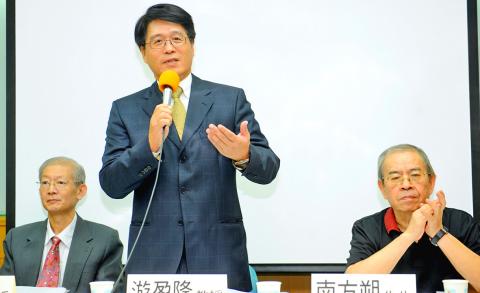More than 60 percent of respondents in a poll support the idea of allowing former president Chen Shui-bian (陳水扁) to receive medical treatment at home and many find it unacceptable that the government refuses to grant him medical parole, the Taiwanese Association for Pacific Ocean Development said.
The group, which commissioned the poll on “Taiwanese people’s attitude toward Chen’s case,” said that the survey shows that 64 percent of respondents backed home medical treatment for Chen, against 23 percent who opposed the idea.
In addition, 59.7 percent of respondents did not approve of President Ma Ying-jeou’s (馬英九) administration’s rejection of calls that Chen be granted medical parole as opposed to 20.6 percent who approved of Ma’s decision, association president You Ying-lung (游盈隆) said.

Photo: Chang Chia-ming, Taipei Times
“Those who thought that Chen did not receive a fair judgement [41 percent] also outnumbered those who believed he did [32 percent],” he added.
Comparing the performance of the past and current presidents, 47 percent of respondents thought Chen did better than Ma, and 21 percent believed otherwise, the survey showed.
More people expressed their approval of Chen’s performance over his eight-year rule (47 percent) than those who said they were dissatisfied (38 percent).
However, more people disagreed with the idea that Chen’s case was a victim of political persecution, at 48 percent, than the 37 percent who agreed, and while 39 percent believed Ma was responsible in the trial of Chen’s case, 46 percent disagreed.
Meanwhile, 45 percent said that amnesty is the only way to solve the controversy about Chen’s case, but 42 percent disagreed.
In general, public opinion seems to show more sympathy toward Chen’s situation after he left office, instead of resentment or condemnation, You said.
About half of the respondents said the Democratic Progressive Party has been indifferent and overly passive about Chen’s situation, he added.
Political pundit Nan Fang Shuo (南方朔), who supports medical parole for Chen, said he found the poll upsetting, as it shows that there are still many who oppose leniency or amnesty for Chen.
There is a disturbing element in Chinese culture called “moral fascism,” or the tendency to discredit or denigrate people accused of a moral crime, Nang Fang Shuo said, adding that whoever speaks in favor of the accused are viewed as accomplices in crime.

Taiwanese can file complaints with the Tourism Administration to report travel agencies if their activities caused termination of a person’s citizenship, Mainland Affairs Council Minister Chiu Chui-cheng (邱垂正) said yesterday, after a podcaster highlighted a case in which a person’s citizenship was canceled for receiving a single-use Chinese passport to enter Russia. The council is aware of incidents in which people who signed up through Chinese travel agencies for tours of Russia were told they could obtain Russian visas and fast-track border clearance, Chiu told reporters on the sidelines of an event in Taipei. However, the travel agencies actually applied

Japanese footwear brand Onitsuka Tiger today issued a public apology and said it has suspended an employee amid allegations that the staff member discriminated against a Vietnamese customer at its Taipei 101 store. Posting on the social media platform Threads yesterday, a user said that an employee at the store said that “those shoes are very expensive” when her friend, who is a migrant worker from Vietnam, asked for assistance. The employee then ignored her until she asked again, to which she replied: "We don't have a size 37." The post had amassed nearly 26,000 likes and 916 comments as of this

New measures aimed at making Taiwan more attractive to foreign professionals came into effect this month, the National Development Council said yesterday. Among the changes, international students at Taiwanese universities would be able to work in Taiwan without a work permit in the two years after they graduate, explainer materials provided by the council said. In addition, foreign nationals who graduated from one of the world’s top 200 universities within the past five years can also apply for a two-year open work permit. Previously, those graduates would have needed to apply for a work permit using point-based criteria or have a Taiwanese company

The Shilin District Prosecutors’ Office yesterday indicted two Taiwanese and issued a wanted notice for Pete Liu (劉作虎), founder of Shenzhen-based smartphone manufacturer OnePlus Technology Co (萬普拉斯科技), for allegedly contravening the Act Governing Relations Between the People of the Taiwan Area and the Mainland Area (臺灣地區與大陸地區人民關係條例) by poaching 70 engineers in Taiwan. Liu allegedly traveled to Taiwan at the end of 2014 and met with a Taiwanese man surnamed Lin (林) to discuss establishing a mobile software research and development (R&D) team in Taiwan, prosecutors said. Without approval from the government, Lin, following Liu’s instructions, recruited more than 70 software